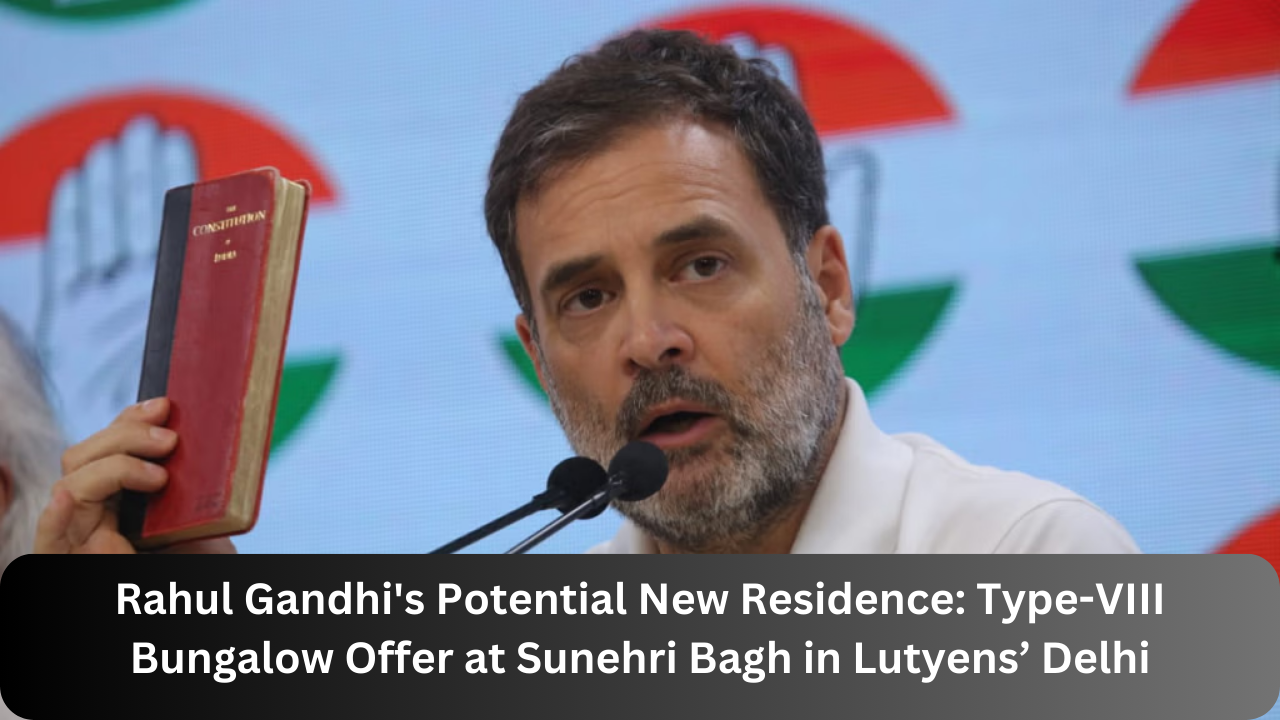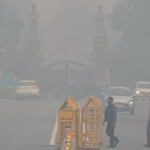As one of India’s prominent political figures, Rahul Gandhi’s choice of residence is not just a personal decision but a matter of public interest. The latest development in his housing situation involves an offer for a Type-VIII bungalow at Sunehri Bagh in Lutyens’ Delhi.
This offer highlights the intersection of politics, real estate, and the evolving dynamics of public life in India. In this comprehensive analysis, we explore the details surrounding this offer, its significance, and the broader context of Rahul Gandhi’s residence.
Understanding the Type-VIII Bungalow Offer
The Type-VIII bungalow offered to Rahul Gandhi is a prestigious property located in Sunehri Bagh, a prime area in Lutyens’ Delhi. This offer has sparked considerable interest due to the bungalow’s significance and the implications for Gandhi’s living arrangements.
Type-VIII Bungalow Characteristics:
- Prime Location: Sunehri Bagh is part of Lutyens’ Delhi, known for its upscale, well-planned layout and proximity to key government buildings and landmarks. The area is characterized by its colonial-era architecture and green spaces, making it a desirable location for high-profile individuals.
- Spacious Layout: Type-VIII bungalows are known for their spacious design and luxurious features. They typically offer ample living space, large gardens, and modern amenities, reflecting their high status.
- Architectural Significance: These bungalows often feature a blend of colonial and contemporary architectural styles, representing both historical and modern influences.
Sunehri Bagh and Its Historical Significance:
Sunehri Bagh is one of the distinguished localities in Lutyens’ Delhi, which has historically housed various prominent figures and dignitaries. The area’s charm lies in its blend of heritage and exclusivity, making it a coveted address. The offer of a Type-VIII bungalow in this area signifies a recognition of the importance of Rahul Gandhi as a political leader.

Political and Personal Implications:
- Political Symbolism: For a leader like Rahul Gandhi, the choice of residence is not just about comfort but also carries political symbolism. Living in a high-profile area such as Lutyens’ Delhi can enhance his public image and signal his status within the political arena.
- Personal Preferences: On a personal level, the offer reflects considerations for privacy, security, and convenience. The Type-VIII bungalow, with its luxurious amenities and secure environment, aligns with these needs.
Rahul Gandhi has previously resided in various locations, including official government accommodations and personal properties. His residence has often been a topic of public interest, reflecting his role and status within Indian politics.
In recent years, there have been discussions about his housing preferences and the need for a new residence that better suits his current role and responsibilities. The offer of the Type-VIII bungalow represents a significant step in addressing these needs.
The acceptance of the Type-VIII bungalow offer involves several steps, including evaluation of the property, discussions about terms and conditions, and consideration of personal preferences. Rahul Gandhi’s decision-making process will likely involve consultations with his advisors, family, and possibly legal and real estate experts.
The offer has garnered significant media attention, reflecting the public’s interest in his residential choices. Media coverage will likely continue as the decision unfolds, with analysis and commentary on its implications.
Rahul Gandhi’s choice to accept or decline the offer will impact public perception of his lifestyle and priorities. A move to a high-profile location like Sunehri Bagh could be seen as a statement of success and stability, while any reluctance or refusal could be interpreted in various ways.
The offer and its acceptance or rejection could have political ramifications. It may influence perceptions of Gandhi’s leadership style, his relationship with the public, and his alignment with the current political climate.
The offer also reflects broader trends in high-value real estate within Delhi. The demand for properties in prestigious areas such as Lutyens’ Delhi continues to drive significant interest, with implications for property values and market dynamics.
The offer of a Type-VIII bungalow at Sunehri Bagh in Lutyens’ Delhi to Rahul Gandhi is more than just a real estate transaction; it is a reflection of his status and the intersection of personal and political factors. As the decision on this offer unfolds, it will provide insight into his priorities and the evolving nature of political life in India. The choice of residence, particularly in a high-profile area like Sunehri Bagh, underscores the significance of public perception and the broader implications for both Gandhi and the Indian political landscape.
As India gears up for another great chapter in its political history, one bright spot is the possible new presence of Rahul Gandhi, the central figure of Indian politics. Lutyens proposal to build a house Type VIII at the iconic Sunehari Bagh in Delhi has attracted much interest and raised concerns about the conflation of personal aspirations and political symbolism This introduction looks at the uniqueness of this idea, Gandhian public and private
Lutyens-Delhi is known for its historical spirit and impressive architecture, making it one of the most sought-after neighborhoods in the capital In this context, Sunehari Bagh Bungalow stands out as the eighth landmark of prestige size and wealth
Rahul Gandhi was given an eighth bungalow at Sunehari Bagh in Lutyens-Delhi, marking a milestone in his personal political career and a gift symbolizing his loneliness and wealth and his high status and the announcement marked his changing personality. The broader context of this proposal highlights the intersection of individual decisions, political symbolism and real estate, profoundly transforming Indian politics
The offer also reflects the trend of luxury real estate in Delhi. The housing market in prestigious districts like Lutyens-Delhi is tight, creating a lot of excitement and competition. Type-VIII bungalow supply reflects current trends in property values and market trends.

Acceptance of a Type VIII bungalow involves a number of processes including determining the desirability of the property, negotiating terms and arranging personal conveyances Certainly discussions with advisers, family members and real estate developers may influence Rahul Gandhi’s decision.
Rahul Gandhi is a very prominent figure in Indian politics and the head of the Indian National Congress. He represents strength and leadership. The endowment of luxury properties such as a Type VIII bungalow can be seen as a recognition of its size and status in the political hierarchy Lutyens belongs to a distinguished political family of prominent citizens of Delhi whose longevity and member of whose influence and power are related.
Gandhi’s home is a personal representation of his preferences and requirements for a way of life. Given his prominent function and the demands of his profession, a Type-VIII bungalow offers a blend of luxury, privacy, and convenience, which may be especially attractive. The home’s features, such its size and security, are appropriate for someone in his situation.











